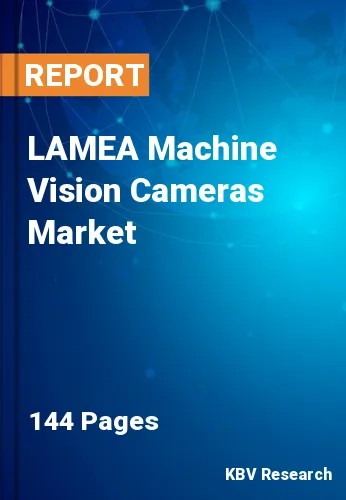The Latin America, Middle East and Africa Machine Vision Cameras Market would witness market growth of 12.6% CAGR during the forecast period (2022-2028).
An organic CMOS image sensor is defined as an improved image sensor that offers many features like high sensitivity and wide dynamic range. There is a broad range of applications of CMOS image sensors in various sectors like consumer electronics, medical & life sciences, automotive, robotics, security & surveillance, and others.
The CMOS image sensor market is witnessing a huge demand owing to the increasing popularity of high-resolution images. Several key market players, such as Panasonic and Canon, aim to create advanced products that draw attention from more customers and gain more revenues. Few of the key factors fuelling the market growth is the better performance in low light and high image resolution; however, fast battery drainage of organic CMOS image sensors as compared to other products is the major factor that hinders the growth of the market.
The rapid adoption of the CMOS technology witnessed in the last few years is owing to the growing demand for high-definition image-capturing devices over a broad range of sectors since it enables a fast shutter speed and helps in capturing a high image quality. Organic CMOS image sensors are widely utilized in various sectors like automotive, security & surveillance, medical & life sciences, consumer electronics, and others due to their capability to capture even smaller pixels and higher resolution at a reduced cost.
Due to an IoT-based condition monitoring network, regular field inspections are reduced, and manual data logging is eliminated. Aside from reducing human mistakes, this adds to cost savings and increases worker productivity by allowing them to focus on other vital activities. In addition, reduced site visits, particularly to remote regions, reduce overall truck trips, reducing fuel consumption and CO2 emissions. Hence, these factors are pushing the demand of Machine Vision Cameras Market.
The Brazil market dominated the LAMEA Machine Vision Cameras Market by Country in 2021, and would continue to be a dominant market till 2028; thereby, achieving a market value of $87.5 million by 2028. The Argentina market is experiencing a CAGR of 13.2% during (2022 - 2028). Additionally, The UAE market would display a CAGR of 12.3% during (2022 - 2028).
Based on End User, the market is segmented into Manufacturing & Packaging, Automotive, Industrial, Healthcare, and Others. Based on Sensor Type, the market is segmented into CMOS Sensor-based Cameras and CCD Sensor-based Cameras. Based on Application, the market is segmented into Measurement, Position Guidance, Quality Assurance & Inspection, Identification, and Others. Based on Platform Type, the market is segmented into PC based Camera, Smart Camera, and Wireless Cameras & Wearable Cameras. Based on Vision Type, the market is segmented into 2D, 3D, and Others. Based on Camera Type, the market is segmented into Line Scan, Area Scan, and 3D Scan. Based on countries, the market is segmented into Brazil, Argentina, UAE, Saudi Arabia, South Africa, Nigeria, and Rest of LAMEA.
Free Valuable Insights: The Global Machine Vision Cameras Market is Predict to reach $4.5 Billion by 2028, at a CAGR of 9.3%
The market research report covers the analysis of key stake holders of the market. Key companies profiled in the report include ISRA Vision AG (Atlas Copco), Sick AG, Microsoft Corporation, Ametek, Inc., Cognex Corporation, Basler AG, Omron Corporation, Keyence Corporation, National Instruments Corporation, and Texas Instruments, Inc.
By End User
By Sensor Type
By Application
By Platform Type
By Vision Type
By Camera Type
By Country
Our team of dedicated experts can provide you with attractive expansion opportunities for your business.

